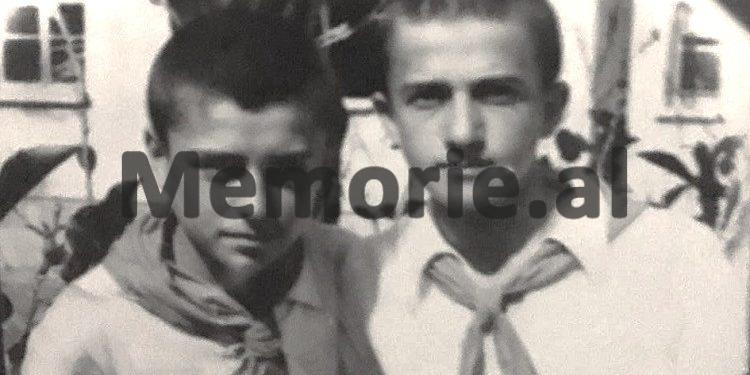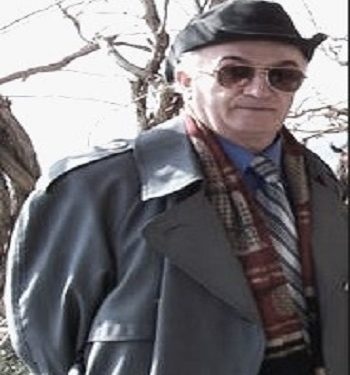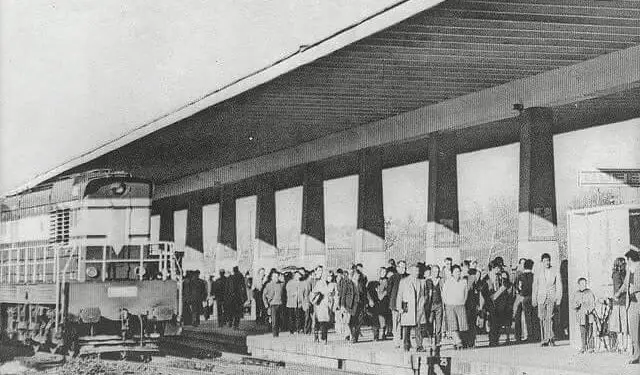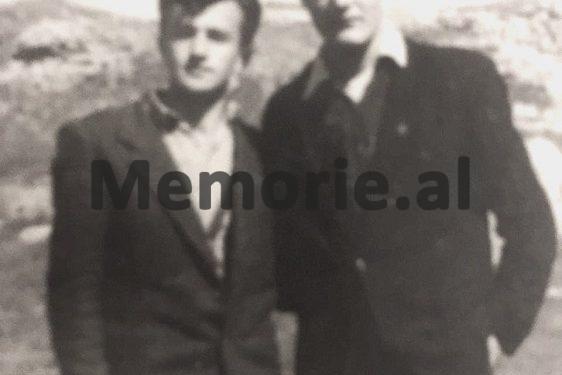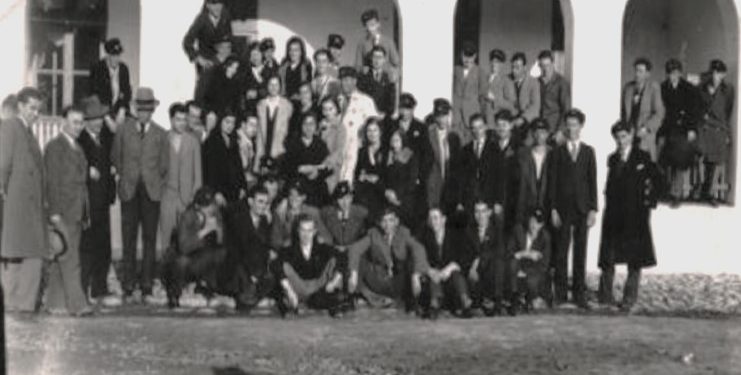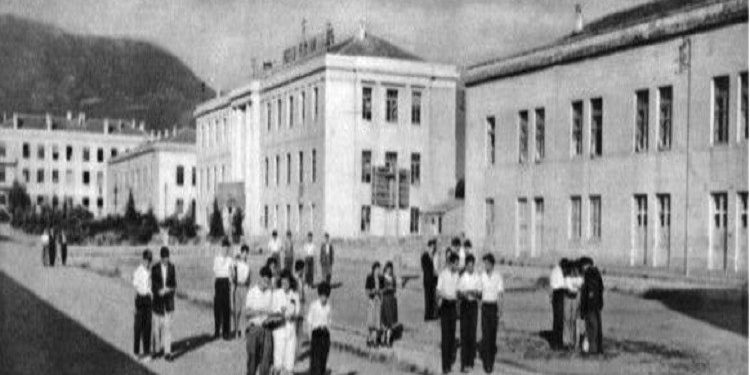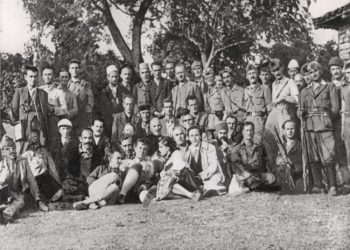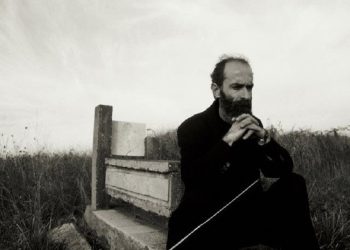From Sokrat Shyti
Part Five
Memorie.al / The writer Sokrat Shyti is the “great unknown” who in recent years has revealed the tip of the iceberg of his literary creativity. I say this based on the limited number of his published books in these last few years, primarily the voluminous novel “Phantom Night” (Tirana 2014). The novels: “BEYOND MYSTERY,” “BETWEEN TEMPTATION AND WHIRLPOOL,” “DIGGING NIGHTMARES,” “SHADOW OF SHAME AND DEATH,” “COLONEL HEADHUNTER,” “TARNISHED HOPES,” “TWISTS OF FATE” I, II, “SURVIVAL IN THE COW SHED,” as well as other works, all novels of 350 to 550 pages, are still in manuscript and await publication. The dreams and initial enthusiasm of the young novelist, returning from studies abroad full of energy and love for art and literature, were cut short early by the harsh blade of communist dictatorship.
Who is Sokrat Shyti?
Having returned from studies at the State University of Moscow just after the break of Albanian-Soviet relations in 1960, Sokrat Shyti worked at Radio “Diapazon” (which at that time was located on Kavaja Street), in an editorial team with his journalist friends – Vangjel Lezho and Fadil Kokomani – both of whom were later arrested and subsequently executed by the communist regime. In addition to the radio, the 21-year-old Sokrat, if we picture him, had passionate literary interests at that time. He wrote his first novel “Madam Doctor” and was on the brink of publishing it, but… alas! Just after the arrest of his friends, to fill the cup, a brother of his, a painter, defected abroad.
Sokrat was arrested in September 1963, and in November of that year, he and his family (his mother and younger sister) were interned in a place between Ardenica and Kolonje of Lushnja. For 27 years, the family lived in a shed for cows made of reeds, without windows, while Sokrat was subjected to forced labor. Throughout those 27 years, he was legally required to report three times a day to the local authority. He had no right to leave the place of internment, was deprived of any type of documentation, etc. In these conditions, amidst a cow shed, he gave birth to and raised his children. Precisely based on this experience, or rather, a very long story of persecution, he was inspired to write the book “Survival in the Cow Shed”!
Agron Tufa
Continued from the previous issue
EXCERPT FROM THE BOOK “SURVIVAL IN THE COW SHED”
(Completely differently, in the convicts’ cafeteria: being alone, he formed his own orchestra, eagerly waiting for the closing hour to relax his arms and ears. Even though he performed this annoying duty reluctantly, he couldn’t oppose it, as he was not allowed as a student to fail the wishes of a community; he would vent his boredom by singing whatever came to his mind, regardless of the fact that the northern peasant culture knew neither how to sing nor to dance these melodies.
Only a few of us would sit next to him to accompany him, knowing that this action would boost his enthusiasm for singing. The caretaker, Tishi, would get annoyed and signal us from his place to interrupt this revelry, as we were there to entertain the convicts and teach them how to dance, not to flaunt that we knew how to sing. But in truth, his problem lay elsewhere: he was boiling inside with anger that the minutes of entertainment were passing into emptiness while the closing hour was approaching.
Mitika, to irritate him, continued his ritual of songs, glancing at us as if to say: don’t pay attention to the gossip from the eager fool! And only in the last 10 minutes would he stop the songs, taking up ordinary dance tunes). I do not know why this image prompted the legend of the Castle of Rozafa, the walling of the brother’s bride, leaving her breast outside to nurse the baby.
I had experienced something similar before, surfacing in my memory like a cinema screen, the explanation full of gusto and humor from the literature professor, perhaps because in this legend, the most terrifying human vices intertwined more naturally than anywhere else: (betrayal, deception, cunning treachery, the dreadful malice among brothers), along with the honest virtues of pure innocence: (the primitive loyalty to integrity, keeping one’s word and promise, even to the self-sacrifice of the life of the dearest person, the spouse, the supreme love of a new mother for her creation, and the last testament devoted to love and the continuity of life!).
At that moment, someone touched me on the shoulder and told me not to doze off, as the bus had arrived in Tirana and we had to get off. I found it surprising how the four-hour journey had flown by without me noticing, while on the first trip, it was quite the opposite—it had annoyed me to impatience!…
With my suitcase in hand, I got off the bus and headed towards the train station. On the “New Albania” boulevard, passersby hurriedly walked to reach their destinations on time. Most were travelers, just like me, heading to the train station to buy tickets, even though the departure was in two hours. At least here, they could be sure of their mode of transportation; it was not like with the bus agencies that announced: tickets sold out! Fortunately, the train gathered all the needy, even when the number of passengers was three times the available seats.
In fact, during the summer months, there was such a massive influx (from Tirana to the railway station, at the beach in Durrës) that it was hard to breathe, and those with weak hearts often risked asphyxiation! This station witnessed the disembarkation of the crowds, which spread along the coastline, up to the Wall of Illyria, beyond which began the “Restricted Zone,” guarded by the soldiers of the Republic’s Guard, day and night, because inside this area were the holiday villas of high-ranking officials.
To my good fortune, may wanted to close its cycle in two days, so the beach season had not yet begun. Even so, one had to wait in line to buy a ticket, so as to sit absorbed somewhere on the platform until the sound of the locomotive’s whistle was heard. In this particular case, when the structure of the train station did not yet exist, and benches were missing, the passengers spread along the platform to find some way to settle comfortably. Under these conditions, my wooden suitcase served as a portable seat. Thus, I sought a shaded spot, to avoid the sun’s rays, and sat atop the suitcase, leaning against a concrete pillar. Then I glanced around, all the way to the end of the platform, hoping to spot someone I knew, although it was too early to notice the movements of students or pupils from the institutes.
After a few minutes, I was again troubled by the disquieting thought of these past two days, the sudden decision of the Pedagogical Council of the school to allow me to go on summer vacation with my family, without having completed the end-of-year exams, with the explanation that for several months of this school year, I had endured quite a heavy load for my age, tackling a demanding curriculum with difficult students. Moreover, thanks to this daring move, I saved two professors of the teaching staff, one from mathematics and the other from physics, who were supposed to find a suitable solution and respond to the official request of the general of the Internal Affairs Department, when the director of the school would tell them to figure out how to act properly without harming themselves, yet still fulfill the request.
Even though this part of the explanation had a compelling power, leaving no room for doubt, the general formulation seemed excessive: “there’s no need for you to take exams because you have excellent results in your studies.” A more persuasive argument to convince me could have sufficed with specific evaluations of the work accomplished. But this still did not strip away suspicions regarding the announcement of the surprising decision. It was a mysterious preamble that concealed a bitter ulterior motive related to a shocking event in the family, ranging from the milder assumption of my father’s deteriorating health to the most dreadful, his sudden death! And again, the nagging point arose: “which person informed the high school administration, how was the request formulated…?!”
“Because the course of the hidden event, as if nothing had happened (which is cloaked under the wait for the completion of the educational process, to give the decision of the Pedagogical Council the most natural and convincing hues), had value for the school director and professors, only to send me away from Shkodra, with as few heavy emotional burdens as possible, considering the long journey and difficult travel conditions. This was where their task ended, and they accomplished it cleverly. In a way, they created the image of the maximum evaluation of the work done, expressing gratitude to me in the manner allowed by a pedagogical body!”
The whistle of the locomotive ended my gnawing thoughts. The travelers on the platform sprang into action. Each aimed to be in the most advantageous position for when the train would stop and the doors would open, without letting the newcomers disembark, climbing aboard the departing ones, the most widespread epidemic disease of poverty, with visible symptoms of a lack of education, which incites mindful creatures to perform uncontrolled actions.
Thus, at train and bus stations, one often sees and hears noisy chaos, accompanied by terribly banal curses and nervous yelling, leaving a normal person astounded and dumbfounded by these shameful scenes, which could be avoided peacefully in just a few minutes if basic norms of civility were adhered to.
I waited until the last passenger got on at the door where I was standing, and then I climbed the steps. Surely the seats were taken, for this is what all the fuss was about. In fact, some behaved so miserly to the point of disgust, claiming “the seats are reserved, we are waiting for them to come,” when right next to them stood elderly people, mothers with small children, and the disabled! A strong intervention was needed to shake these ill-mannered people into awareness, but such action was the responsibility of the ticket inspector and the train police. A woman from the mountainous area of Has, about fifty years old, dressed traditionally, spoke to me in a low voice, asking me to sit next to her.
“Please, don’t squeeze in too much!” I replied, thanking her. “Here I have my chair with me…,” I added with a smile, pointing to the wooden suitcase. “I’ll sit on it next to you. Where are you going?” I asked after a while.
“To the Lushnje district, to the small village of Kosovo,” she replied with a deep sigh.
“Did you have a wedding, and are you going for some reason?” I inquired further.
“I’m going to see my daughter, as I’ve missed her so much!” she said. “You must have heard that in Kosovo e Vogël of Lushnja, there’s a prison for women and girls…”!
“Has she been condemned for revenge against a blood feud?”
“My daughter has the face of an angel and a spirit as pure as the waters of our mountains. She wouldn’t harm even a fly, let alone a person…!” – “But then what happened, that she is locked up in the prison of Kosovo?” I asked, quite troubled. “She fell victim to a terrible fate: when she discovered that her husband was cheating on her, she asked him to take her to her parents because she couldn’t bear to sleep with a tainted man!
He became furious, tied her hands and feet to the beam of the barn, and shouted in her face that she would die there! If her parents or brother came to get her, he would unleash a torrent of curses upon our girl, like what is used for slaughtering, and in the end, he would only allow her to return to the tower where she was born, mounted on a horse, facing the tail, with a sack over her head!… When we learned the truth about what had happened to our girl, it felt like the sky had fallen on our heads, and our hearts began to flutter.
We discussed as husband and wife how to save her from the killer and escape this unfortunate situation without causing bloodshed. Because it was impossible to approach his tower; he was watching us from the slits. We couldn’t even enter the village. In these difficult conditions, a cousin of mine, married here, a brave and fierce woman, who takes blood in the eyebrow, offered to help us.
This came at a moment when the girl’s husband went somewhere on horseback, and she entered the barn and untied her. Then, together with her, they secretly made their way through the forest paths until they reached our tower. My husband thanked her for her courage, risking her life. Because after this action, which soon spread throughout our region, the tower of the tainted man became covered with shame, as it was unheard of for a married woman to be tied to the pillar of shame in that sort of faith, conducted only by the most rabid killers, for daring to tell her husband that she could not sleep with a man tainted with betrayal.
Of course, my cousin faced two terrible punishments: Her husband could divorce her for acting on her own head without consulting him, and for bringing two towers into hostility for breach of faith! Or if he chose not to act, our tainted son-in-law would kill her because he had tarnished her honor, by degrading her! So it fell upon us to protect her and justify her actions before her husband, thanking her a hundred times for saving our girl from that disgrace. This would mean that our tainted man was expected to be seen with malice on his shoulders.
That’s why the girl stayed day and night on alert, with her eye on the target. She feared the killer would take revenge on her, bringing it upon her father or brother. If such a horrible calamity occurred, she would never forgive herself. She had sworn to take her revenge for the torture when the killer bound her hands and feet behind the beam of the barn and left her there to urinate for an entire week! Such a dreadful humiliation could only be avenged with blood. She was convinced that her husband’s monstrous savagery against her innocence and purity could only be punished with a bullet! She considered it a sin to leave him alive among the living. Our girl, determined to restore her dishonored name, finally found the chance to take down the raging beast!… And, as a brave woman, she went to the police to surrender herself.”
“How many years was she sentenced to?” I asked, as the mountain woman paused for a moment.
“Can you imagine that we have pure justice?! The scoundrels quickly find a common language. What happened to their creature, the marital betrayal, with the greatest impudence, was blamed on our girl, as if she had dishonored his tower with her hidden affairs, revealed at the right time. In fact, in his disgraceful statements, the scoundrel judge dared to say that the deceased showed restraint and patience, did not use the dowry dagger to punish her according to the Code, because love prevented him; therefore, he only tied her up, did not take her life! And he did not pay any attention to my cousin’s true testimony, revealing how he kept her tied behind the barn beam for a week, not allowing her even to urinate!”
“Still, we should not give up hope, because: justice may be delayed, may go wrong, but one day what is right will come to light,” I said to comfort her. “The measure of punishment is indeed determined by the judges. But justice is not solely theirs to dictate. You should appeal to the Assembly. Write a letter with an open heart. Describe the incident as it occurred. Explain why the marriage between the two towers turned into a fatal enmity
At the railway station of Rrogozhina, the terminal node for travelers from half the country, whenever trains arrived from two directions, the north and the east, extraordinary scenes could be observed, starting with the rushed disembarkation from the steps without the train stopping, an action that often caused injuries and fractures, followed by mass stampedes toward the street to crowd around the doors of the bus lines; it was the same as what happened during the push to board the train cars. When I got off the carriage along with the mountain mother, my arms loaded with bags, I called out to the familiar driver of the Berat bus by name.
(Luckily, he didn’t stop the bus below at the road bend but pulled it up right near the station, where he calmly awaited his passengers, knowing that they were waiting for tickets at the Tirana agency and that there was no need to rush). – “Are you going to Lushnja, or as you are loaded, should I take you straight to Uncle Naun?” he asked somewhat surprised when he saw me with the bags. First, after setting the load down on the ground, I greeted him and asked about the health of his family and the progress of his work, and then briefly explained the mountain woman’s great plight. In the end, I begged him to take her place until Çifligu i Ri, where the road leads to Kosovo e Vogël.
“You haven’t left Naun anything from your kindness…, – said the driver, shaking his head. – I’ll mention this to him when I see him. I found out about this and will help her with her problem. You’re just coming straight from school to go home for summer vacation? I imagine that after you rest and catch up with your mother, you’ll probably be around us for a few days…,” he added. – “I don’t need to say that he’s been eagerly waiting for you! An extraordinary case that an uncle would love his nephew, the son of his sister, with such affection…?!”Memorie.al
Continued in the next issue
Copyright©“Memorie.al”
All rights to this material are exclusively and irrevocably owned by “Memorie.al”, in accordance with Law No. 35/2016 “On Author’s Rights and Related Rights”. It is strictly prohibited to copy, publish, distribute, or transfer this material without the authorization of “Memorie.al”; otherwise, any violator will be held liable under Article 179 of Law 35/2016.




